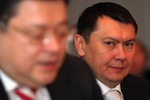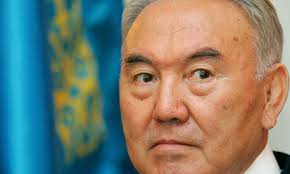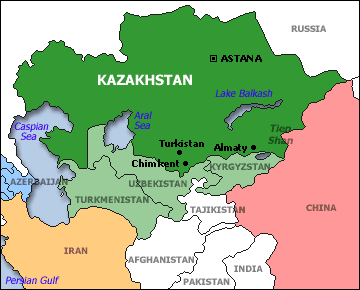 The estranged former son-in-law of Kazakhstan's president has been found hanged in a Vienna jail cell, after an eight-year effort by the Central Asian government to bring him home to face murder and racketeering charges.
The estranged former son-in-law of Kazakhstan's president has been found hanged in a Vienna jail cell, after an eight-year effort by the Central Asian government to bring him home to face murder and racketeering charges.
 The estranged former son-in-law of Kazakhstan's president has been found hanged in a Vienna jail cell, after an eight-year effort by the Central Asian government to bring him home to face murder and racketeering charges.
The estranged former son-in-law of Kazakhstan's president has been found hanged in a Vienna jail cell, after an eight-year effort by the Central Asian government to bring him home to face murder and racketeering charges.
 Rakhat Aliyev rose to the height of influence and power in Kazakhstan, marrying the president's daughter and controlling many of the country's major companies. By the time he was found dead in a Vienna jail cell today while awaiting trial for murder, he'd been on the lam from his former father-in-law for eight years.
Rakhat Aliyev rose to the height of influence and power in Kazakhstan, marrying the president's daughter and controlling many of the country's major companies. By the time he was found dead in a Vienna jail cell today while awaiting trial for murder, he'd been on the lam from his former father-in-law for eight years.
 Rakhat Aliyev, the Kazakh president's former son-in-law turned opponent, has been found dead in an Austrian jail from an apparent suicide, a court spokeswoman said on Tuesday.
Rakhat Aliyev, the Kazakh president's former son-in-law turned opponent, has been found dead in an Austrian jail from an apparent suicide, a court spokeswoman said on Tuesday.
 Facing early elections, Kazakhstan has been steadfast in refusing to devalue the tenge but the dangers of an over-valued currency are already evident and may ultimately force official action. Kazakhstan's biggest trade partners, notably Russia, have seen their currencies fall sharply against the dollar in the past year. On the weekend, fellow ex-Soviet energy exporter Azerbaijan became the latest to devalue.
Facing early elections, Kazakhstan has been steadfast in refusing to devalue the tenge but the dangers of an over-valued currency are already evident and may ultimately force official action. Kazakhstan's biggest trade partners, notably Russia, have seen their currencies fall sharply against the dollar in the past year. On the weekend, fellow ex-Soviet energy exporter Azerbaijan became the latest to devalue.
 Kazakhstan's sovereign wealth fund, which controls oil producer KazMunaiGaz and the nation's rail monopoly, said selling its companies' foreign-currency earnings alone won't stave off pressure on the tenge to decline.
Kazakhstan's sovereign wealth fund, which controls oil producer KazMunaiGaz and the nation's rail monopoly, said selling its companies' foreign-currency earnings alone won't stave off pressure on the tenge to decline.
 Moves are afoot in Kazakhstan to hold a snap presidential election. Proponents say an early election would give incumbent strongman Nursultan Nazarbayev a fresh mandate as the country faces a slumping economy and regional geopolitical tensions over the Ukraine conflict.
Moves are afoot in Kazakhstan to hold a snap presidential election. Proponents say an early election would give incumbent strongman Nursultan Nazarbayev a fresh mandate as the country faces a slumping economy and regional geopolitical tensions over the Ukraine conflict.
 Kazakhstan's slowing economy is pinching the country's industrial heartland. Several industrial behemoths have announced cutbacks that they blame on a toxic mix of factors hitting their bottom lines, from falling commodity prices to an overvalued tenge. And as the enterprises pass the losses onto their workers, Astana is looking on anxiously, with memories of violent unrest in Kazakhstan's oil fields still fresh.
Kazakhstan's slowing economy is pinching the country's industrial heartland. Several industrial behemoths have announced cutbacks that they blame on a toxic mix of factors hitting their bottom lines, from falling commodity prices to an overvalued tenge. And as the enterprises pass the losses onto their workers, Astana is looking on anxiously, with memories of violent unrest in Kazakhstan's oil fields still fresh.